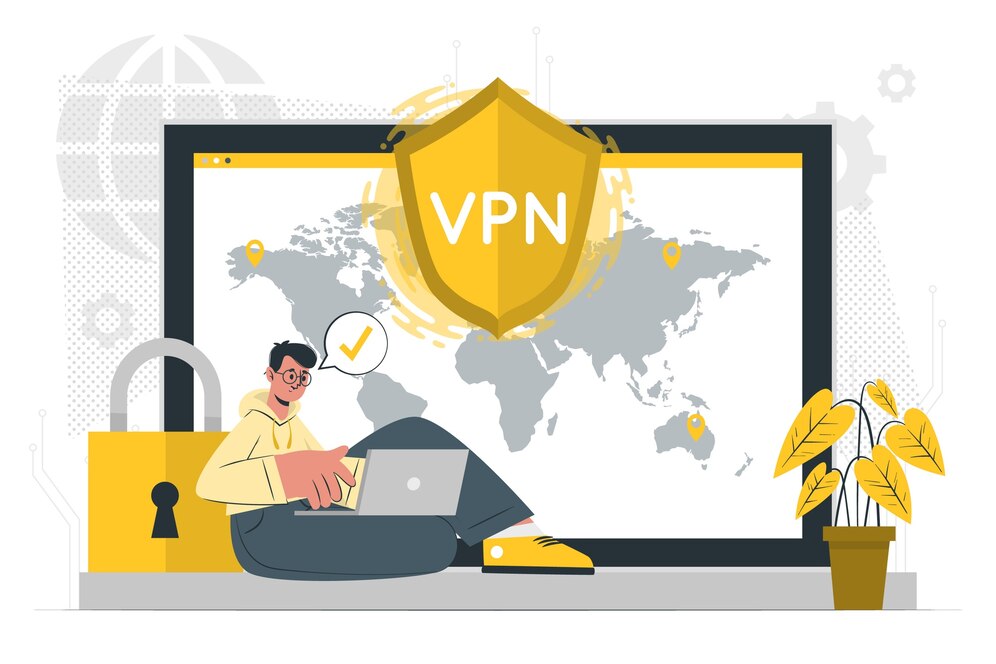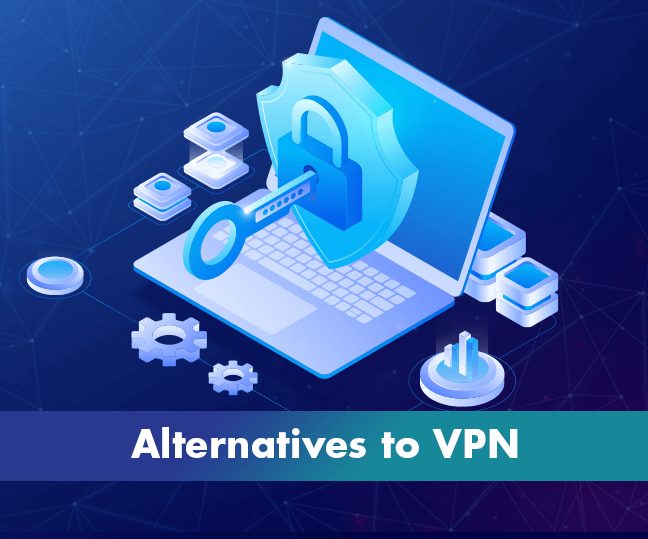VPN Alternatives:
In today’s world, where everyone is working from home, one particular term may resonate with everyone, old and young—that is a “virtual private network,” also popularly known as a VPN. A VPN ensures that a secure remote access connection is established between employees and the private corporate network. With the help of a VPN, any employee can gain access to the files that are placed within an enterprise’s work servers.
Though VPN usage is widely observed in most organizations, it is a lesser-known fact that there are other solutions in the market with functionalities similar to a VPN while also providing even stronger and more advanced security solutions. Many organizations are now starting to prefer VPN alternatives for remote access.
In this article, we would like to discuss some of the VPN alternatives that enterprises can use.
What is a Virtual Private Network?
VPN technology is used by corporations worldwide mainly because it is safe and secure. VPN can be defined as the encrypted connection over the internet from a device to the network. The main reason for the encrypted connection is to make sure that all the organization’s sensitive data is being transferred safely. The usage of a VPN also ensures that no malicious actors external to the organization can gain access to the files and systems, thus avoiding data breaches.

What Are Some VPN Security Risks?
No matter how strong you think your VPN is, there is always a loophole in the system that poses a threat to the organization and some of them are listed below:
- Logging Policies
The whole idea of using a VPN is to make sure that no one gets access to the data that has been browsed on and what if the provider himself logs these? So, if you really want to make the maximum out of your VPN solution we then recommend that you to go with a zero log policy.
- Data Leaks
Data leaks are one of the common issues, sometimes no matter how strong a VPN you use, you are still exposed to the threat of data leaks through the IP tunnel. Some of the best examples of data leaks are IP leaks and DNS leaks. One of the major reasons for these kinds of leaks is because of the poor configuration and sometimes it can also occur due to browser-related issues. One has to check with the provider to that they are providing the necessary safeguards.
- Shady Privacy Policy
Privacy policies can sometimes prove to be the biggest scams. Most of the service providers make a lot of hue and cry about respecting the privacy of their clients while the story is completely different once you are on-boarded onto their network. They surreptitiously make it a point in their clause of using the data of the user. Most of the service providers collect the data and sell to advertisers which are then used for targeted marketing and remarketing purposes.
Why Alternatives to VPN for Business 2023?:
The need for alternatives to VPN for businesses in 2023 arises for several reasons. While VPNs have been a popular way to secure online communications for decades, they have limitations that can impact their effectiveness in certain situations. Here are some reasons why businesses might consider alternatives to VPN in 2023:
Scalability – VPNs can become slow and unreliable when used by large numbers of users simultaneously, making it difficult to scale up for growing businesses.
Complex network environments – With the increasing complexity of modern networks, it can be challenging to configure and manage VPNs effectively, leading to potential security gaps and performance issues.
Cloud adoption – The move towards cloud-based applications and services can make providing secure and efficient VPN access to cloud resources difficult.
Cost – VPN solutions can be expensive to deploy and maintain, especially for smaller businesses that may not have the resources to manage the infrastructure.
Security – While VPNs offer a layer of security, they can also be targeted by attackers, who can exploit vulnerabilities in the VPN software or the user’s endpoint device to gain unauthorized access.
These challenges have led businesses to look for alternative solutions that can provide a more efficient and cost-effective way to secure online communications and protect sensitive data.
VPN Replacement:
As technology advances and the internet becomes more accessible, the need for secure connections has become increasingly important. One of the most popular ways to achieve this security is through the use of a Virtual Private Network (VPN). However, there are several reasons why you might want to consider replacing your VPN with an alternative solution. In this blog post, we will explore some of the reasons why you might want to replace your VPN and some possible alternatives.
Reason to Replace VPN:
- Slower Internet Speeds: One of the most common complaints about VPNs is that they can slow down internet speeds. This can be frustrating, especially if you are trying to stream video or download large files.
- Limited Device Compatibility: Some VPNs are not compatible with all devices, which can be problematic if you have multiple devices you need to secure.
- Cost: VPNs can be expensive, especially if you are looking for a premium service.
- Security Concerns: Although VPNs are meant to be secure, there have been instances where VPNs have been hacked or compromised.
What Are the Limits of a VPN?
Like every other system and software, even a VPN has its own set of drawbacks which we have listed below:
- Decrease in speed
Since it reroutes and encrypts the connection to the internet through a VPN server, hence the speed of the internet decreases substantially. So always test the VPN speed when trying out a provider.
- Getting blocked
Many service providers like Netflix, BBC, HULU etc. can block the IP address which accesses their service with a large number of connections as these services can guess when you are using the VPN.
- Legal issues
In some countries, it is absolutely legal to use a VPN while in the other countries it is not as in these countries their government wants to have complete data of what their citizens are browsing.
- Slower connection
VPN routes all your traffic, not only the one you require to be routed but everything functioning in the background too. It delays the flow of your work. Moreover, VPN utilizes a local client to make a connection to the server & any problem with a device you are using might delay your connection even more.
- Security risks
VPN usually has no security against malware. Of course, you could utilize a VPN with built-in malware detection or have other security systems that are used between a VPN & the corporate network.
What are the best VPN Alternatives for your business?
One can find a plethora of alternatives to a VPN for Remote Access but one has to be very clear about their features before choosing any.
- Replace VPNs with a third-party security platform
Using third-party security platforms as VPN Alternatives makes the elevation, onboarding and termination of access privileges for the external users well under control. These third-party remote access solutions adheres to the guidelines continuously provides top notch services.
- Replace VPNs with Zero Trust
Using Zero Trust as VPN alternatives for business can be helpful as in this system all the users are considered as threats and they have to verify themselves to be granted access. The zero-trust approach has proven to be effective for both internal and external user access, which also happens to be its USP as VPNs don’t support this.
- Infraon SecuRA as a VPN Alternative
If you already using a VPN service and are not quite happy about its functionality then, it is a high time you should start looking for an alternative to VPN as one cannot compromise the data of enterprises. A product like Infraon SecuRA can be invaluable as it provides a far reaching zero trust remote access to enterprise users and specific external third-party need based access that may have to be granted from time to time.
What to consider before selecting a VPN Alternative
Every business has unique security requirements, and it’s essential to find an alternative to Virtual Private Networks that meshes with those needs. Several elements come into play when selecting an alternative, including:
- The number of connections – How many users will the network require to support? Using an easy-to-scale third-party security platform might make sense if there are high needs. A more in-depth ZTNA (Zero Trust Network Access) implementation might come into play if few user numbers are involved.
- Is virtualization relevant? – Few businesses are well suited to the use of virtual desktops. For instance, customer support teams often find VDIs useful to limit the transferal of customer data and log employee activity. But that’s not always the case for remote workers. Generally, more independent workers will benefit from a ZTNA/Secure remote access based alternative.
- Cost – How much can you invest in a VPN alternative? VPNs are reasonable and easy to use, becoming the dominant protection solution. However, ZTNA/Secure remote access based solutions are competitive and more secure, which results in long-term savings. Generally, long-term investment trumps short-term cost reductions, but balancing cost and functionality is always a problem.
ZTNA/Secure remote access solutions require security teams to create access lists and set up device profiling, user monitoring, and network segmentation protocols. Team will need training in security behaviors, and it will probably be essential to create third-party authentication arrangements. Make sure you have the expertise and team to implement VPN alternatives.
Future-proofed yet? It’s time to mitigate dangerous IT risks with Zero Trust
Zero Trust combines identity verification and policy-based permission for every identity attempting to use the network or IT resources. The person or entity may be inside the enterprise’s network or access the network remotely. Zero Trust is a framework using different technologies and best practices to know who is trying to access or use the data and if they have permission to do so.
Learn More
Still curious? Click here to find out Future-proofed yet? It’s time to mitigate dangerous IT risks with Zero Trust
Conclusion
In the online world that we do business today, all organisation are prone to cyber threats and data breaches – especially when most of the employees are working from home and employees use a multitude of access systems which increases the threat potential. In these circumstances, the organisation that takes a proper step at the right time regarding choosing the best alternate for a VPN can keep the multitude of threats at bay.
So, prior to choosing any alternative for a VPN it is advisable to get a thorough and complete picture of the offering. With Infraon SecuRA, you can sleep in peace knowing that your enterprise’s data is safe and sound. Just fill out our form and will get back to you at the soonest.
FAQs
1. What are VPNs’ Security Risks?
While Virtual Private Networks (VPNs) are designed to provide a secure and private connection, some potential security risks are still associated with using them. Here are some of the most common security risks associated with VPNs:
- Malware Infections
- Logging and Data Collection
- Data Leaks
2. What are the best VPN Alternatives for your business?
When it comes to choosing the best VPN alternatives for your business, there are several options to consider. Here are some of the top VPN alternatives that you might want to explore:
- Proxy Servers
- Cloudflare Access
- Remote Desktop Protocol
- Secure Shell (SSH) Tunnels
- Software Defined Perimeter (SDP)
3. Why would I need a VPN replacement?
There are several reasons why you might need a VPN replacement. Some VPNs are not reliable, have poor performance, or are not compatible with certain devices. Additionally, some countries have restricted the use of VPNs, making them difficult to use.
4. How do I choose the right VPN replacement?
To choose the right VPN replacement, you should consider factors such as security, privacy, speed, compatibility, ease of use, and cost. You should also read reviews and compare features to find the best option for your needs.
5. What are VPN alternatives?
VPN alternatives are a range of tools and technologies that provide secure remote access to a company’s network and resources without relying on a traditional VPN. While offering similar functionalities as VPNs, these alternatives come with additional benefits, including enhanced security, improved performance, and increased flexibility.
6. What are the benefits of using VPN alternatives?
Using VPN alternatives provides several benefits to businesses. These alternatives offer enhanced security protocols such as multi-factor authentication, IAM, and micro-segmentation that can secure the network and resources from cyber attacks. VPN alternatives improve performance by using techniques such as edge computing, CDNs, and SD-WAN to reduce latency and optimize bandwidth usage. These alternatives are more scalable, can handle a larger volume of traffic without compromising performance, and offer greater flexibility to access company resources from anywhere using any device. Additionally, VPN alternatives can help businesses reduce the cost and complexity of managing traditional VPN solutions, making it an attractive option for optimizing remote access capabilities.
7. Can VPN replacements work with existing IT infrastructure?
Yes, VPN replacements can work with existing IT infrastructure, but it depends on the specific solution chosen and the compatibility with the business’s current IT environment.
8. How easy is it to switch from a VPN to a VPN replacement?
The ease of switching from a VPN to a VPN replacement depends on the specific solution chosen and the complexity of the existing IT infrastructure. However, our VPN replacements offer easy deployment and management, making the transition smoother for businesses.











